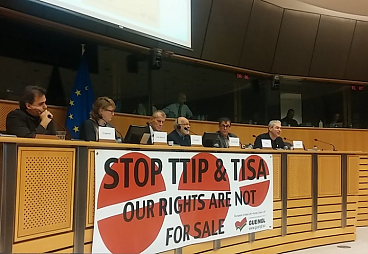TTIP – The State of Play
TTIP – The State of Play

Whether we’re going to end up with the Transatlantic Trade and Investment Pact – the TTIP – no-one can any longer say. Resistance is growing but the interests involved are major. The supporters no longer assume they’ve won. Under pressure from public opinion one thing and another is being changed, but the dangers still haven’t gone away.
By Anne-Marie Mineur
 On Wednesday 2nd December the Chair of the European Parliament International Trade Committee, German social democrat Bernd Lange, dropped a bombshell: all of the papers from the TTIP negotiations would henceforth be available to all Euro-MPs. When you consider how secretive former European Commission Karel de Gucht had been about these talks, then it’s quite an achievement that the opposition has managed to wrest this openness. Previously only a handful of MEPs had been able to view a number of selected documents, so this is certainly an improvement.
On Wednesday 2nd December the Chair of the European Parliament International Trade Committee, German social democrat Bernd Lange, dropped a bombshell: all of the papers from the TTIP negotiations would henceforth be available to all Euro-MPs. When you consider how secretive former European Commission Karel de Gucht had been about these talks, then it’s quite an achievement that the opposition has managed to wrest this openness. Previously only a handful of MEPs had been able to view a number of selected documents, so this is certainly an improvement.
In addition, the controversial arbitration system, Investor State Dispute Settlement (ISDS), is being re-examined. The arbitrators will no longer meet in a hotel room, and instead a public and official court will be established. Conditions will be set regarding the training and background of the arbitrators. Investors will furthermore have to choose where their case will be heard, in the national legal system or in the arbitration system. Once they’ve opted for one or the other, they won’t be able to switch. The system will no longer be called the ISDS, a term which is too tainted, but the ICS, the Investment Court System. These plans have been received with great rejoicing, and the new system has even been adopted in the EU’s recently completed treaty with Vietnam.
These developments show how great the pressure on the European Commission is, both to grant more openness in relation to the TTIP negotiations, and to throw out the ISDS. It’s good news that the broad public resistance clearly moved things along. The Citizens’ Initiative Stop TTIP garnered 3.2 million signatures, and the public consultation on the ISDS attracted 150,000 reactions, of which 97% were expressly negative. The Commission must certainly do something if it wants to give the impression that it listens to the people. Yet to say that the problems are solved by these proposals is to go much too far.
Novel transparency
Improvements in relation to transparency are fine, but there remains a great deal to be desired. Bernd Lange says that all of the papers will be available to every MEP, but that goes only for the EU papers. There’s still nothing known about the US contribution.
In addition, this transparency has not been extended to anyone beyond Members of the European Parliament. The public will not have access to more papers, while the MEPs may not share their findings with experts on trade treaties, arbitration systems or the specific products under negotiation, such as Greek feta, Dutch starch or the American shipping industry. That means also that the debate around the free trade treaties can take place only behind the parliament’s closed doors, and not out in the open where it belongs.
Lastly, the new rules are only applicable to the papers concerning TTIP. Free trade treaties with other countries, such as Canada (the CETA), Japan, Vietnam, New Zealand and Australia will continue to be negotiated in complete seclusion. That puts the joyful tone of comments about ‘complete transparency’ in rather a different light.
Class justice
On close examination the new arbitration system which has been introduced with such fanfare also falls somewhat short. The ugliest spots have been removed, the deepest wrinkles botoxed away, but ICS remains a devil of a system. The most essential question - namely why doesn't a foreign investor simply have to obey the country's laws, just like everyone else? – is simply ignored. While it's true that a possibility to appeal has been built into the system, such an appeal will still not be heard by a normal court which could test it against the democratically established laws of the land.
Strong criticism has also been made of the fact that the system will be run by private arbitrators paid by the hour who might in the rest of their worktime be employed in the business world. The ICS is a special court with special rights for foreign investors, a court which is unavailable to a country's own investors, let alone to the public or to social organisations. The fact that it costs at least €8 million, means in addition that small- and medium-sized firms are in practice excluded from this preferential treatment. Class justice for multinationals. There's still plenty of work to be done.
The Americans are stalling
‘If the Americans don’t come across with something, then we’re out of the talks,’ said French Trade Secretary Matthias Fekl at the end of September. Perhaps things haven’t quite come to that, but rumours that the negotiations aren’t going well are strong. Barack Obama is the best candidate to conclude the talks as far as the supporters of TTIP are concerned. If the Republicans continue their upward curve and also win the presidential elections, the chances are great that they will opt for more protectionism. But the Democrats too are concerned by a huge amount of negative media coverage of the Trans-Pacific Partnership (TPP), the other free trade treaty, which has recently been completed. From a US perspective the TTIP is less threatening than the TPP. The cultural differences between Europe and the US are significantly smaller and in the US the former will lead to higher rather than lower standards. As things stand there is little discussion in the States of the TTIP. All attention is going to the TPP
A second Trojan Horse
It’s therefore far from clear whether the TTIP will still actually arrive, though it can be said at least that it hasn’t yet been scrapped. It should be added that, away from the glare of publicity to which the treaty is currently subject, intense work is being put into completing the Comprehensive Economic and Trade Agreement (CETA), the equivalent treaty for Canada. These negotiations are in fact done and dusted, the only delay being for the legal experts who are busy dotting the i’s and crossing the t’s, and then for the translators who must render the treaty’s text into all of the European Union’s languages. The CETA bears a close resemblance to the TTIP, and despite pressure from various parliamentary groups it still contains the old ISDS system. That could mean that arbitration cases against the Netherlands could be brought by Canadian investors. This would be novel, because until now it has been for the most part Dutch investors who have instituted such proceedings elsewhere. In addition to opening the door to Canadian investors, moreover, we will also have to take into account the fact that many US corporations have considerable interests in Canadian firms. As a result, TTIP is actually superfluous. The struggle for a democratically regulated economy is far from over. The SP group in Brussels will be in the thick of it.
This article appeared in original Dutch in de December 2015 issue of "Spanning"
- See also:
- World
